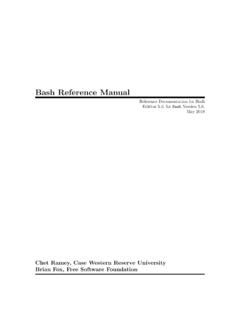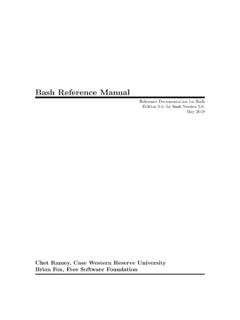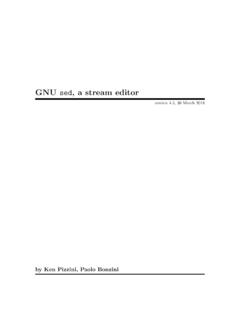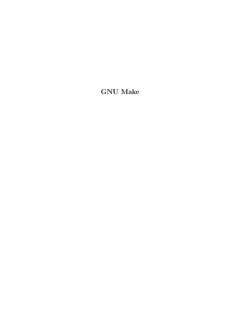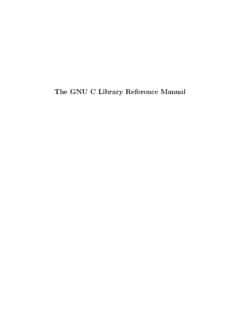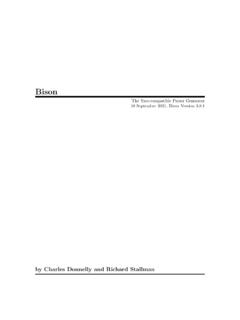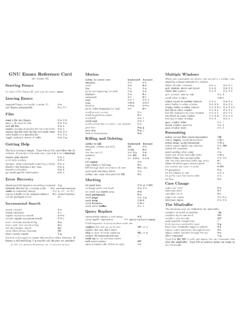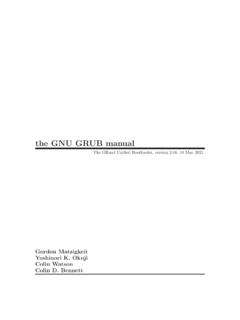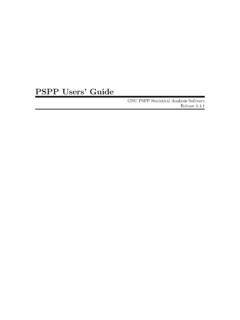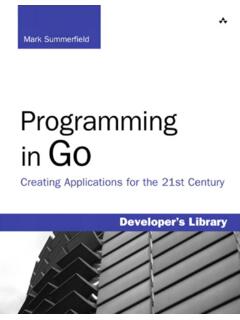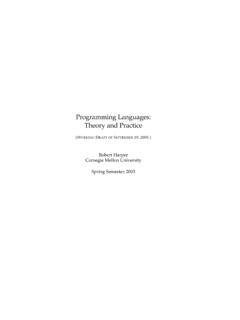Transcription of GNU Coding Standards
1 GNU Coding StandardsRichard Stallman, et updated February 19, 2019 The GNU Coding Standards , last updated February 19, 1992, 1993, 1994, 1995, 1996, 1997, 1998, 1999, 2000, 2001, 2002, 2003, 2004,2005, 2006, 2007, 2008, 2009, 2010, 2011, 2012, 2013, 2014, 2015, 2016, 2017, 2018 FreeSoftware Foundation, is granted to copy, distribute and/or modify this document under the terms ofthe GNU Free Documentation License, Version or any later version published by the FreeSoftware Foundation; with no Invariant Sections, no Front-Cover Texts, and no Back-CoverTexts. A copy of the license is included in the section entitled GNU Free DocumentationLicense .iTable of Contents1 About the GNU Coding Keeping Free Software Referring to Proprietary Accepting General Program Which Languages to Compatibility with Other Using Non-standard Standard C and Pre-Standard Conditional Program Behavior for All Non-GNU Writing Robust Library Formatting Error Standards for Interfaces Standards for Graphical Standards for Command Line Standards for Dynamic Plug-in Table of Long OID Memory File Making The Best Use of Formatting Your Source Commenting Your Clean Use of C Naming Variables, Functions.
2 And Portability between System Portability between Calling System Character Quote Documenting GNU Doc Strings and Manual Structure License for Manual Printed The NEWS Change Change Log Style of Change Simple Conditional Indicating the Part Man Reading other The Release How Configuration Should Makefile General Conventions for Utilities in Variables for Specifying : Support for Staged Variables for Installation Standard Targets for Install Command Making References to Non-Free Softwareand A GNU Free Documentation About the GNU Coding StandardsThe GNU Coding Standards were written by Richard Stallman and other GNU Projectvolunteers. Their purpose is to make the GNU system clean, consistent, and easy to document can also be read as a guide to writing portable, robust and reliable focuses on programs written in C, but many of the rules and principles are useful even ifyou write in another programming language .
3 The rules often state reasons for writing in acertain you did not obtain this file directly from the GNU project and recently, please checkfor a newer version. You can get the GNU Coding Standards from the GNU web server inmany different formats, including the Texinfo source, PDF, HTML, DVI, plain text, andmore, at: you are maintaining an official GNU package, in addition to this document, pleaseread and follow the GNU maintainer information (seeSection Contents inInformationfor Maintainers of GNU Software).If you want to receive diffs for every change to these GNU documents, join the via the web interface Archives are also available send corrections or suggestions for this document Ifyou make a suggestion, please include a suggested new wording for it, to help us consider thesuggestion efficiently. We prefer a context diff to the Texinfo source, but if that s difficultfor you, you can make a context diff for some other version of this document, or propose itin any way that makes it clear.
4 The source repository for this document can be found Standards cover the minimum of what is important when writing a GNU , the need for additional Standards will come up. Sometimes, you might suggest thatsuch Standards be added to this document. If you think your Standards would be generallyuseful, please do suggest should also set Standards for your package on many questions not addressed or notfirmly specified here. The most important point is to be self-consistent try to stick tothe conventions you pick, and try to document them as much as possible. That way, yourprogram will be more maintainable by GNU Hello program serves as an example of how to follow the GNU Coding standardsfor a trivial release of the GNU Coding Standards was last updated February 19, Keeping Free Software FreeThis chapter discusses how you can make sure that GNU software avoids legal difficulties,and other related 2: Keeping Free Software Referring to Proprietary ProgramsDon t in any circumstances refer to Unix source code for or during your work on GNU!
5 (Orto any other proprietary programs.)If you have a vague recollection of the internals of a Unix program, this does not abso-lutely mean you can t write an imitation of it, but do try to organize the imitation internallyalong different lines, because this is likely to make the details of the Unix version irrelevantand dissimilar to your example, Unix utilities were generally optimized to minimize memory use; if you gofor speed instead, your program will be very different. You could keep the entire input filein memory and scan it there instead of using stdio. Use a smarter algorithm discoveredmore recently than the Unix program. Eliminate use of temporary files. Do it in one passinstead of two (we did this in the assembler).Or, on the contrary, emphasize simplicity instead of speed. For some applications, thespeed of today s computers makes simpler algorithms go for generality. For example, Unix programs often have static tables or fixed-sizestrings, which make for arbitrary limits; use dynamic allocation instead.
6 Make sure yourprogram handles NULs and other funny characters in the input files. Add a programminglanguage for extensibility and write part of the program in that turn some parts of the program into independently usable libraries. Or use a simplegarbage collector instead of tracking precisely when to free memory, or use a new GNUfacility such as Accepting ContributionsIf the program you are working on is copyrighted by the Free Software Foundation, thenwhen someone else sends you a piece of code to add to the program, we need legal papersto use it just as we asked you to sign papers who makes a nontrivialcontribution to a program must sign some sort of legal papers in order for us to have cleartitle to the program; the main author alone is not , before adding in any contributions from other people, please tell us, so we can arrangeto get the papers. Then wait until we tell you that we have received the signed papers,before you actually use the applies both before you release the program and afterward.
7 If you receive diffs tofix a bug, and they make significant changes, we need legal papers for that also applies to comments and documentation files. For copyright law, commentsand code are just text. Copyright applies to all kinds of text, so we need legal papers forall know it is frustrating to ask for legal papers; it s frustrating for us as well. But if youdon t wait, you are going out on a limb for example, what if the contributor s employerwon t sign a disclaimer? You might have to take that code out again!You don t need papers for changes of a few lines here or there, since they are notsignificant for copyright purposes. Also, you don t need papers if all you get from thesuggestion is some ideas, not actual code which you use. For example, if someone sent youone implementation, but you write a different implementation of the same idea, you don tneed to get 3: General Program Design3 The very worst thing is if you forget to tell us about the other contributor.
8 We could bevery embarrassed in court some day as a have more detailed advice for maintainers of GNU packages. If you have reachedthe stage of maintaining a GNU program (whether released or not), please take a look: seeSection Legal Matters inInformation for GNU TrademarksPlease do not include any trademark acknowledgments in GNU software packages or acknowledgments are the statements that such-and-such is a trademark ofso-and-so. The GNU Project has no objection to the basic idea of trademarks, but theseacknowledgments feel like kowtowing, and there is no legal requirement for them, so wedon t use is legally required, as regards other people s trademarks, is to avoid using them inways which a reader might reasonably understand as naming or labeling our own programsor activities. For example, since Objective C is (or at least was) a trademark, we madesure to say that we provide a compiler for the Objective C language rather than an Objective C compiler.
9 The latter would have been meant as a shorter way of saying theformer, but it does not explicitly state the relationship, so it could be misinterpreted asusing Objective C as a label for the compiler rather than for the don t use win as an abbreviation for Microsoft Windows in GNU software ordocumentation. In hacker terminology, calling something a win is a form of praise. You refree to praise Microsoft Windows on your own if you want, but please don t do so in GNUpackages. Please write Windows in full, or abbreviate it to w. SeeSection [SystemPortability], page General Program DesignThis chapter discusses some of the issues you should take into account when designing Which Languages to UseWhen you want to use a language that gets compiled and runs at high speed, the bestlanguage to use is C. C++is ok too, but please don t make heavy use of templates. So isJava, if you compile highest efficiency is not required, other languages commonly used in the freesoftware community, such as Lisp, Scheme, Python, Ruby, and Java, are OK too.
10 Scheme,as implemented by GNU Guile, plays a particular role in the GNU System: it is the preferredlanguage to extend programs written in C/C++, and also a fine language for a wide rangeof applications. The more GNU components use Guile and Scheme, the more users are ableto extend and combine them (seeSection The Emacs Thesis inGNU Guile ReferenceManual).Chapter 3: General Program Design4 Many programs are designed to be extensible: they include an interpreter for a languagethat is higher level than C. Often much of the program is written in that language , Emacs editor pioneered this standard extensibility interpreter for GNU software is Guile ( ), which implements the language Scheme (an especially clean andsimple dialect of Lisp). Guile also includes bindings for GTK+/GNOME, making it practicalto write modern GUI functionality within Guile. We don t reject programs written in other scripting languages such as Perl and Python, but using Guile is the path that will leadto overall consistency of the GNU Compatibility with Other ImplementationsWith occasional exceptions, utility programs and libraries for GNU should be upward com-patible with those in Berkeley Unix, and upward compatible with Standard C if StandardC specifies their behavior, and upward compatible with POSIX if POSIX specifies these Standards conflict, it is useful to offer compatibility modes for each of C and POSIX prohibit many kinds of extensions.
